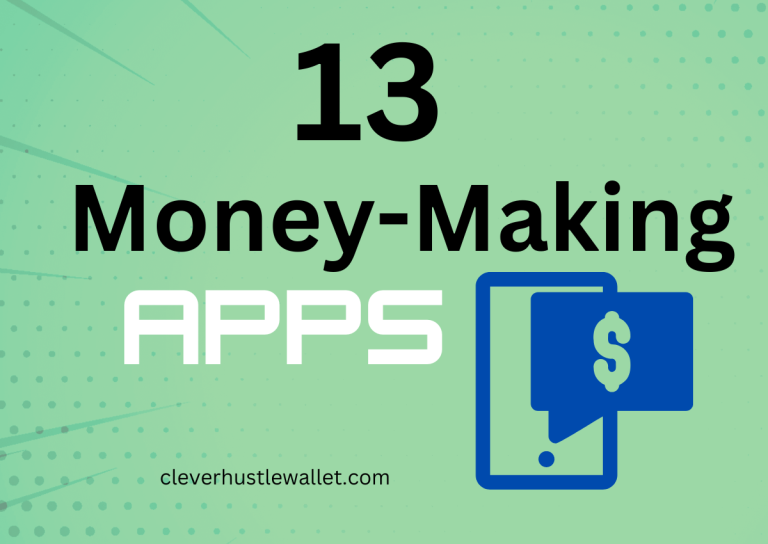Best Trading Platforms for Day Trading in 2026
Clever Hustle Wallet has compiled a list of the best trading platforms that offer low rates for your investments, with a robust app selection.
The best trading platforms have easy-to-use integrations, free and fast trading options for a wide variety of investments.
Best Trading Platforms for Day Trading
In our findings from the trading platforms, we can firmly state that Fidelity and Webull are the best trading apps for beginners. For active investors and traders, ETrade and Fidelity offer more mature options.
Fidelity vs WeBull Vs E-Trade
If you’re wondering which trading platform is best for you, here is a comparison of Fidelity vs Webull, and E-Trade.
| Benefits | Fidelity | E*TRADE | Webull |
|---|---|---|---|
| Best For | Long-term investors, retirement planning, mutual funds | Active traders, options investors | Beginner & active traders who want zero commissions + crypto |
| Commissions (Stocks & ETFs) | $0 per trade | $0 per trade | $0 per trade |
| Options Trading Fees | $0.65 per contract | $0.65 per contract | $0 per contract |
| Mutual Funds Available | 10,000+ (many no-load, no-fee) | 8,000+ | ❌ Not offered |
| Crypto Trading | ✅ Limited (Bitcoin, Ethereum via Fidelity Crypto) | ❌ Not supported | ✅ Supported (BTC, ETH, DOGE, etc.) |
| Research & Education Tools | ⭐⭐⭐⭐ Exceptional — deep analysis, reports, screeners | ⭐⭐⭐ Strong — good screeners and data for traders | ⭐⭐ Basic — charts and community insights |
| Mobile App Experience | ⭐⭐⭐⭐ Intuitive, robust mobile investing app | ⭐⭐⭐⭐ Great app for active traders | ⭐⭐⭐⭐ Fast, simple, modern UI |
| Customer Service | 24/7 phone + 200+ branches | 24/7 phone + online chat | Online chat & email only |
| Retirement Accounts (IRA, 401k) | ✅ Full suite available | ✅ Full suite available | ❌ Limited options |
| Fractional Shares | ✅ Available | ✅ Available | ✅ Available |
| Cash Management / Debit Card | ✅ Integrated Fidelity Cash Management Account | ✅ Checking & cash features via Morgan Stanley | ✅ Limited cash management features |
| Trading Platforms | Active Trader Pro (desktop) + web + mobile | Power E*TRADE + web + mobile | Webull App + desktop trading software |
| Paper Trading / Simulated Trading | ❌ No | ❌ No | ✅ Yes (ideal for practice) |
| Minimum Deposit | $0 | $0 | $0 |
| Ease of Use (Beginner Friendly) | ⭐⭐⭐⭐ Very beginner-friendly | ⭐⭐⭐ For intermediate traders | ⭐⭐⭐⭐ Great for new investors |
| Advanced Tools (Charts, Technicals) | ⭐⭐⭐⭐ Excellent | ⭐⭐⭐⭐ Excellent | ⭐⭐⭐⭐ Excellent |
| Overall Reliability / Reputation | A+ — long-established, trusted | A — strong legacy brand under Morgan Stanley | B+ — newer, modern, fast-growing platform |
| Overall Rating (2025) | 🟢 9.5 / 10 | 🟡 8.8 / 10 | 🔵 8.5 / 10 |
Best Trading Platforms for Beginners
Fidelity, Webull, or E-Trade, which is the best trading platform for beginners? In conclusion, if you are a newbie to trading, Webull will be the best trading platform.
| Investor Type | Best Choice | Why |
|---|---|---|
| Active trader/options investor | Fidelity | Best balance of reliability, research, and full-service options |
| New investor/crypto & mobile-focused user | E*TRADE | Excellent trading tools and fast execution |
| New investor / crypto & mobile-focused user | Webull | Zero-fee trading + crypto + paper trading for beginners |
The Best Trading Platforms
Our research team dives deep into every platform — reviewing features, tools, and trading experiences from the perspective of real investors and day traders.
Each broker is analyzed through a detailed assessment covering everything from account setup and funding to executing trades and using research or analysis tools.
For this roundup, Clever Hustle Wallet selected the best trading platforms based on several key factors: stock and options trading costs, investment variety, trade execution quality, margin rates, third-party research access, mobile app usability, trading platform experience, and overall reliability score.
1. Fidelity
The word fidelity means loyalty or trust, and Fidelity Investments truly lives up to its name. As one of the most respected global financial services firms, Fidelity offers a complete suite of tools designed to help investors grow and protect their wealth.
At Clever Hustle Wallet, we evaluate platforms not just by reputation but by results. Fidelity stands out for its robust research tools, zero-commission trading, and wide range of investment options — making it one of the best choices for both beginners and experienced investors.
Key Features
- Commission-Free Trading for U.S. stocks, ETFs, and options.
- Advanced Research Tools, including screeners, third-party reports, and detailed market analysis.
- Comprehensive Investment Options — mutual funds, bonds, IRAs, retirement planning, and fractional shares.
- Top-Tier Customer Support with 24/7 phone service and 200+ branch locations.
- Cash Management Account with debit card and ATM access.
- Educational Resources that make complex investing simple for beginners.
Pros
- Excellent reputation and reliability — trusted by millions globally.
- No account minimums and low overall fees.
- Powerful desktop and mobile trading platforms (Active Trader Pro).
- Ideal for long-term investors and retirement planning.
- Consistent innovation in tech and AI-driven investing tools.
Cons
- Limited access to cryptocurrency trading (only select coins).
- The platform can feel complex for brand-new investors at first.
- Some advanced features may require a learning curve.
2. Webull
Webull is a modern, commission-free trading platform designed for investors who want speed, simplicity, and advanced tools — without the high fees. Built for today’s mobile traders, Webull combines intuitive design with powerful analytics, making it a favorite for both beginners and active investors who love real-time data and sleek performance.
Key Features
- Commission-Free Trading for U.S. stocks, ETFs, and options.
- Crypto Trading Access for Bitcoin, Ethereum, Dogecoin, and more.
- Paper Trading Mode — practice trading with virtual funds before going live.
- Fractional Shares — invest with small amounts, perfect for beginners.
- Advanced Charting Tools — 50+ indicators, drawing tools, and real-time data.
- Extended Trading Hours — pre-market and after-hours sessions included.
- No Minimum Deposit — open an account with $0 to start.
- Mobile-First Experience — fast, clean, and user-friendly app.
Pros
- $0 commissions across stocks, ETFs, and options.
- Access to crypto trading and fractional shares.
- Paper trading is ideal for learning risk-free.
- Sleek, powerful mobile app with advanced charting.
- Easy account setup — great for beginners and side hustlers.
- Extended trading hours give investors more flexibility.
Cons
- No access to mutual funds or bonds.
- Limited retirement and long-term investing options.
- Customer support can be slower compared to traditional brokers.
- Lacks deep educational content for new investors.
3. E-Trade
ETRADE, now part of Morgan Stanley, is a full-featured brokerage platform designed for both casual investors and active traders. It combines professional-grade tools with a beginner-friendly interface, offering a balance between flexibility and power. Whether you’re managing long-term investments or trading daily, ETRADE provides the tools to do both effectively.
Key Features
- Commission-Free Trading for U.S. stocks and ETFs.
- Options Trading at $0.65 per contract, with discounts for high-volume traders.
- Diverse Investment Choices including stocks, ETFs, mutual funds, bonds, CDs, and futures.
- Advanced Trading Platforms — Power E*TRADE for professionals, and an easy-to-use standard platform for everyday investors.
- In-Depth Research Tools with real-time data, market screeners, and third-party insights.
- Mobile App Suite — choose between a simple investing app or the advanced Power E*TRADE app for active trading.
- No Account Minimum — start investing with $0 to open an account.
- Integrated Banking through Morgan Stanley, offering debit cards and checking options for seamless money management.
Pros
- Excellent balance between beginner usability and advanced trading tools.
- Comprehensive investment options — great for both long-term investors and active traders.
- Powerful charting, market analysis, and customizable screeners.
- Strong research and educational resources.
- Backed by Morgan Stanley for added stability and trust.
- No minimum balance required to start trading.
Cons
- No fractional share investing — you must buy full shares.
- No crypto trading — lacks direct access to cryptocurrencies.
- Customer service can be slower compared to top-tier competitors.
- Platform complexity may overwhelm complete beginners.
- Fees for niche services like broker-assisted or OTC trades.
4. Robinhood
Robinhood is a mobile-first brokerage app designed to make investing simple, fast, and accessible to everyone. It’s a favorite among beginner investors who want to trade stocks, ETFs, options, and even crypto — all in one place. Robinhood’s mission is to democratize finance, giving users commission-free trading and a clean, intuitive experience.
Robinhood stands out for its zero-commission structure, crypto trading access, and instant deposits — but it’s not without limitations for those seeking depth and advanced tools.
Key Features
- Commission-Free Trading for U.S. stocks, ETFs, and options.
- Cryptocurrency Trading, including Bitcoin, Ethereum, and Dogecoin.
- Fractional Shares — invest small amounts in top companies.
- Cash Management with interest paid on uninvested cash balances.
- Robinhood Gold — premium plan offering margin trading, deeper research, and larger instant deposits.
- Instant Deposits — trade immediately after funding your account.
- User-Friendly Design — simple and intuitive app experience for new investors.
- No Account Minimums — anyone can start investing with any budget.
Pros
- Easy-to-use interface perfect for beginners.
- Zero commissions on stock, ETF, and options trades.
- Supports both crypto trading and fractional shares.
- Quick access to funds with instant deposit features.
- Earn interest on idle cash through Robinhood Cash Management.
- Simple onboarding and fast account setup.
Cons
- Limited investment options — no mutual funds or bonds.
- Lacks advanced research, analytics, and trading tools.
- Relies on Payment for Order Flow, which may affect trade execution quality.
- History of regulatory issues and occasional outages during volatile markets.
- Customer service can be slow or difficult to reach.
Clever Hustle Wallet Verdict:
Robinhood is ideal for new investors and side hustlers who want to start trading quickly with little to no cost. Its clean interface, crypto access, and zero commissions make it highly appealing. However, serious investors who value deeper research tools, broader asset choices, or top-tier reliability may prefer platforms like Fidelity or E*TRADE for long-term wealth building.
Best Platforms for Trading and Investing
5. M1 Finance
M1 Finance is a hybrid investing & automation platform designed for passive investors who want a “set-and-forget” approach. It combines automated portfolio management with customization, letting users build their own themed “pies” of stocks and ETFs and automate contributions, rebalancing, and dividend reinvestment.
At Clever Hustle Wallet, we value tools that reduce friction and help investors stay consistent. M1 Finance shines in delivering automation, portfolio control, and ease without much ongoing effort. But it isn’t ideal for active trading or speculative moves.
Key Features
- Customizable “Pie” Portfolios — build a portfolio made of slices (stocks & ETFs) and adjust allocations as desired.
- Automatic Rebalancing — the platform automatically buys or sells to maintain your target allocation over time.
- Recurring Investments & Auto Contributions — schedule regular investments without manual action.
- Dividend Reinvestment — dividends are automatically reinvested into your portfolio.
- Fractional Shares — invest with small amounts, as M1 allows fraction-based ownership.
- No Account Minimum for Basic Tier — start using basic features with no minimum balance.
- M1 Plus / Premium Tier — additional benefits such as early trade windows, “Smart Transfers,” and more frequent rebalancing (for a fee).
- Cash Management Feature — idle cash in the account can earn interest or be used automatically in the pie allocations.
Pros
- Great for hands-off, long-term investing — minimal maintenance needed.
- High degree of customization within your portfolio “pies.”
- Access to fractional shares means you can invest even with modest capital.
- Automatic rebalancing and reinvesting keep your portfolio aligned over time.
- Recurring contributions help build consistent wealth habits.
- The premium tier offers extra features for more engaged users.
Cons
- Not suitable for active traders — lacks day trading tools, advanced charting, or fast execution.
- Limited to stocks and ETFs — no support for crypto, options, or bonds in some cases.
- The free tier is somewhat basic — many advanced features are locked behind M1 Plus.
- Because trades are batched (not instantaneous), your transactions may execute with some delay.
- Customer support and educational offerings are modest compared to full-service brokers.
Clever Hustle Wallet Verdict:
M1 Finance is a fantastic option for investors who want to automate as much of their investing as possible while retaining control over portfolio structure. If you’re looking to invest consistently, avoid the day-to-day hassle, and grow wealth steadily, M1 makes a lot of sense. However, if you’re into active trading, high-frequency tactics, or speculative moves, you’ll likely find its limitations too constraining.
6. Charles Schwab
Charles Schwab is a full-service brokerage and financial services firm with a long track record. It’s known for combining robust investing tools with trust and stability. For many investors, Schwab strikes a compelling balance between professional-grade offerings and a user-friendly interface.
Key Features
- Commission-Free Trading for U.S. stocks and ETFs.
- Options Trading with competitive per-contract pricing.
- Wide Investment Universe — includes stocks, ETFs, mutual funds, bonds, CDs, and more.
- Proprietary Platforms — both desktop (Schwab StreetSmart) and web/mobile tools for different investor types.
- In-Depth Research & Analytics — Schwab offers its own research plus integrations with third-party analysts.
- Fractional Shares (Schwab Stock Slices) — ability to buy partial shares of S&P 500 companies.
- Retirement & Advisory Services — full suite of retirement accounts, guided portfolios, advisory options.
- No Minimums for Many Accounts — you can start investing with modest amounts.
- Cash Management / Banking Integration — Schwab offers checking, debit cards, and cash sweep options.
Pros
- Strong reputation and stability — long history in financial services.
- Very broad asset selection — ideal for investors who want diversification.
- Powerful tools and research — support for both beginners and advanced users.
- Great mix of DIY and advisory services — you can choose how much help you want.
- Fractional share investing allows smaller investors to participate.
- Good integration of banking and investment functions for seamless money flow.
- Solid customer support and physical branches in many locations.
Cons
- Some advanced features may require a learning curve for beginners.
- While many services are low cost, certain specialty trades (e.g. broker-assisted, international) may carry higher fees.
- Tools and interfaces can feel overwhelming to users who just want a simple app.
- In high market volatility, trade execution or platform slowdown may occasionally occur (same risk as any large broker).
Clever Hustle Wallet Verdict:
Charles Schwab is a strong all-around choice for investors who want access to a full menu of tools, services, and asset types, backed by a trusted institution. It’s especially good for those who plan to grow, evolve, or diversify their strategies over time. If you want flexibility, strong support, and longevity in your investing partner, Schwab is a top contender.
Best Trading Platforms FAQs
What Stocks Are Best for Day Trading?
While no one can predict exactly how a stock will perform, certain characteristics make some stocks more attractive for day traders than others. The best day trading stocks are typically highly liquid, meaning they have a large trading volume that allows you to enter and exit positions quickly. They’re also relatively volatile, giving you opportunities to profit from short-term price swings — buying low and selling high within the same day.
Equally important is familiarity. The more you understand a stock’s price behavior, history, and how it reacts to events like earnings reports or market news, the better equipped you are to make smart, timely decisions. In short, the best day trading stocks combine liquidity, volatility, and insight — giving traders both opportunity and control.
What’s the Best Trading Platform for Beginners or New Investors?
The best trading platform for beginners is one that’s easy to use, low-cost, and helps you learn as you grow. Platforms like Fidelity and Charles Schwab are ideal for new investors because they combine user-friendly design, zero-commission trading, and strong educational tools. Both offer reliable customer support and resources that guide you through your first trades with confidence.
For those who prefer simplicity and automation, M1 Finance is great for hands-off investing, while Robinhood appeals to beginners who want to start quickly with small amounts and access both stocks and crypto.
Ultimately, the best platform is the one that matches your goals, comfort level, and learning pace — a place where you can start small, build confidence, and expand as your financial knowledge grows.






